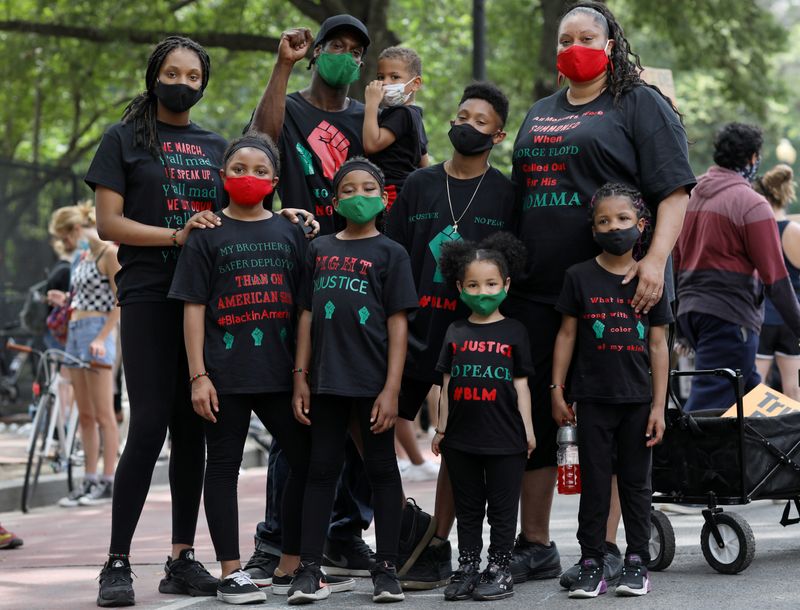By Makini Brice
WASHINGTON (Reuters) - Americans have taken to the streets following the death of George Floyd, who died in Minneapolis on May 25 after a white police officer pinned his knee against his neck for nearly nine minutes.
Protesters and activists say Floyd's death, captured on video, is a particularly stark example of why U.S. policing policies should be reformed, and particularly their treatment of black men and women.
Police-involved fatalities in the United States average nearly three deaths per day, a study https://www.reuters.com/article/us-health-race-police-deaths/police-involved-deaths-vary-by-race-and-place-idUSKBN1KL2M4 published in the American Journal of Public Health showed. Black and Latino men in the United States are twice as likely as white men to die during interactions with police.
Americans of all ages and races are pushing for police reform. Here are five who marched on Saturday in Washington, D.C.
ZEKE THOMAS
Zeke Thomas, 30, who works at a child welfare agency, attended the protest with his five-year-old son, Jay, in part to "show him how to fight, the proper way to fight."
Asked what he wanted to see emerge from these protests, Thomas said, "Change, like actions that show that black lives matter." He added that he wanted to see reforms made within police departments on their use of force and their general culture.
PATRICK KEYSER:
Patrick Keyser, 27, is an Episcopal priest who said he was attending the protest to show solidarity with the demonstrators and hoped they would lead to "an end to police brutality and the killing of black bodies at the hand of the police."
"There comes a point where you can't just sit on the sidelines. ... I can't quite put my hands on it, but there's sort of this intangible spirit that I think anyone feels present here that are driving people to stand up peacefully."
ANGELO VILLAGOMEZ:
Angelo Villagomez, 41, a resident of Washington, D.C. who is originally from the Northern Mariana Islands, said he hoped the protests would bring about a more just society.
"Today's march is about 'Black Lives Matter.' It's about George Floyd and all the young black men who lost their lives to" police brutality, the ocean conservationist said.
"People are listening maybe for the first time in their lives," he added.
SAM GOLDMAN:
Sam Goldman, 33, drove to Washington, D.C. from her home of Philadelphia to be part of the protests. An organizer for the group Refuse Fascism, Goldman said she wanted to see an end to the presidency of Donald Trump.
"I genuinely do want to see the end to being murdered by the police ... I want to see that there is no more police state," Goldman said. She does not think those changes are possible if Trump wins the Nov. 3 election.
KATRINA FERNANDEZ
Katrina Fernandez, 42, is a homemaker who lives in Martinsburg, West Virginia. The mother of eight children aged three to 23, said her family drove nearly two hours to the federal district to teach her children about social justice.
"I felt like the best thing that I could do was come out here and show them what it feels like to be on the front line of something that we really, really believe in and that we want to see a change in," Fernandez said, who was at the protest with her husband and seven of her eight children. Her oldest son is in the Army and stationed in Afghanistan.
Fernandez said she wanted to see "bad cops" thrown off police departments and the convictions of the officers involved in Floyd's killing.

"It's a real bad shame that I feel more safe with my son overseas deployed in a war-torn country than I do on American soil as a black civilian in civilian clothes," Fernandez said.